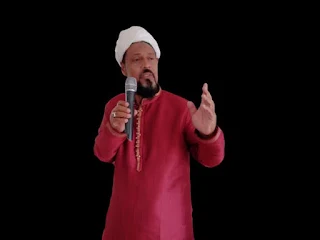Monday, May 24, 2021
The Quest for 'Ummat-e-Wahida'
Thursday, May 20, 2021
'Pray for Humanity'
Moreover, in a context of great upheavals and calamitous events shaking humanity to its core, Hazrat Khalifatullah (aba) counsels the Ummah to demonstrate brotherhood and solidarity and to rise above differences, in finding answers to difficult challenges in saving humanity from the brink of disaster. Recommending everyone to benefit from the deep resources of the living faith of Islam, including the exemplary model of the Holy Prophet (sa), Hazrat Khalifatullah (aba) exhorts the believers to become truly caring, generous and compassionate individuals who feel the pain and do everything they can to wipe the tears of fellow humans. "Today the world needs loyal adherents of this Rahmatul-lil-Aalameen who are ready to sacrifice themselves and their possessions for the well-being of mankind," notes Hazrat Saheb (aba).
Read the Friday Sermon Below:
The Safeguard of Humanity
I am thankful to Allah (swt) that He has given us the opportunity to have two Eids today (one Eid-ul-Fitr and Eid-ul-Jummah). As all our Muslims brothers, sisters and children know, the holy month of Ramadan, during which fasting is obligatory for those professing the Islamic faith, is a perpetual reminder of their other obligations to the Almighty and to humanity at large. One of them is Zakaat which represents an annual levy on their income and assets. Over the last couple of decades we have seen the emergence of a number of benevolent societies which in a very scientific and professional manner and in strict accordance with the precepts of the Shariah have endeavoured to collect and channel the proceeds of Zakaat donations to the most needy and deserving members of society.
The fact remains, however that notwithstanding the above initiatives and in spite of the substantial progress our country has made, a number of Mauritian citizens [and the other peoples of the earth] has been left on the fringe of this development. Living as they do, in the precarious conditions engendered by poverty, these persons daily chores seems like a battle against hope, not only for obtaining the basic comforts of a home but incredible as it may appear, even for their daily meals. The plight of the children is made worse as they are deprived of the essential tools to enable them to benefit from proper schooling and education which might have helped to extricate themselves from the shackles they are imprisoned in.
I hope that in the coming year we might be able to pool our efforts together so as to buy some solace to all those in our countries [and especially here in Mauritius] who are still struggling to survive. The help, devotion and contribution of each of us Muslims, be it in Mauritius and the world at large is needed to enable those necessities of life to reach their proper destination. This is the actual reason that the Zakaat has been instituted by Allah and His Messenger (pbuh), to enable the equal repartition of riches between the rich and the poor, to maintain the balance of wealth in the Islamic world and beyond.
Wednesday, May 19, 2021
'Eid-ul-Fitr' Sermon 2021
Read the Eid-ul-Fitr Sermon Below:
Peace and Happiness
Eid-ul-Fitr is the gift of Allah (swt), so I wish to convey my warmest greetings and best wishes to all my Muslim brothers, sisters, and children, and especially all my dear and sincere disciples around the world. May Allah (swt) reward all Muslims for their endurance as well as their obedience and devotion to Him during the Holy month of Ramadan. Since fasting is obligatory on all Muslims during Ramadan, celebrating Eid today is incumbent upon all our Muslims brothers, sisters and children as a community; it is the occasion offered to us all to enjoy the divine favours upon us, to rejoice, to wear our best, to be at our best and to eat and drink what best has been prepared for it is expressly forbidden to fast on this festive day. But as always in Islam, all in the spirit of moderation!
Sunday, May 9, 2021
On 'Zakaat' & 'Sadaqaat'
Read the Extracts from the Friday Sermon Below:
In the Holy Qur'an, Allah (swt) says:
“And be steadfast in prayer (Salaat); practice regular charity (Zakaat).” (Al-Baqara, 2: 44)
“Take of their riches a donation to purify them and to cleanse them thereby; and pray for them; surely your prayer is sereneness (i.e., tranquillity) for them; and Allah is Ever-Hearing, Ever Knowing. Do they not know that it is God Himself who accepts repentance from His servants and receives what is given freely for His sake and that He is The Accepter of repentance, The Most Merciful?” (At-Tauba, 9:103-104)
“None of you [believers] will attain true piety unless you give out of what you cherish: whatever you give, God knows about it very well.” (Al-Imran, 3:93)



